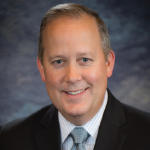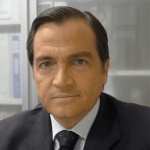At the recent Florida Society of Rheumatology meeting, ACR Executive Vice President Steven Echard, IOM, CAE, emphasized the importance of collaborations between the national and state-based rheumatology organizations while describing the ACR’s plans to modernize and expand its activities and offerings. The goal, he said, is to enhance growth to better serve ACR/ARP members and engage more rheumatology professionals in volunteer and leadership positions.
Mr. Echard outlined several points from the ACR’s education strategic plan, including improving access to ACR educational activities and ensuring easy-to-use learner experiences. The COVID-19 pandemic helped speed up some of these plans, such as an increasing shift to virtual meetings, including ACR Convergence in 2020 and 2021. Virtual meetings have attracted more attendees and doubled the number of international participants, Mr. Echard says.
As part of modernizing, Mr. Echard also emphasized the value and effectiveness of the RISE registry, which now has 2.6 million patients represented and more than 25.8 million encounters.
Encouraging Engagement
Mr. Echard shared ongoing plans for collaboration between the ACR and a variety of state rheumatological societies and other groups. Plans to increase engagement also include analyses done by a Governance Task Force to look at organizational processes, such as the role of the board and committees, diversity and inclusion and how to enable more member involvement. For example, some task force and other meetings are now held in the evenings or on weekends to avoid interrupting patient appointment times.
With ACR member interest in volunteering currently exceeding the available slots, the ACR is also looking for new ways to tap the energy and expertise of more members, Mr. Echard said. ACR leaders are also developing a global outreach plan to collaborate with international partners and expand the group’s footprint.
Coordinated efforts on the federal and state levels are driving many of the ACR’s advocacy priorities, including:
- Pharmacy benefit manager (PBM) reform;
- Physician reimbursement, with continued support for updated evaluation and management codes and higher reimbursement for cognitive care as part of the Medicare Physician Fee Schedule;
- Step therapy reform at the federal level, building on state-level wins, and focusing on implementation of laws at the state level;
- Prior authorization reform at both federal and state levels; and
- Rheumatology workforce priorities, such as federal funding for the Pediatric Subspecialty Loan Repayment Program, securing visas for international medical graduates to provide care in underserved areas and a push for state governments to fund loan repayment programs for rheumatologists and other cognitive specialists who choose to work in underserved areas.
Organizational growth through these efforts in modernization and engagement will drive an expansion of the ACR’s programs, services, educational programming and overall influence, Mr. Echard said. “The goal is to include all stakeholders,” he added.
Also presenting at the meeting to discuss ACR collaboration was ACR treasurer Douglas White, MD, PhD, Gundersen Health System, Onalaska, Wisc. Dr. White and Iain B. McInnes, FRCP, PhD, University of Glasgow, U.K., reviewed highlights from the most recent European Alliance of Associations for Rheumatology (EULAR) and ACR meetings, which Dr. White said were successful despite challenges due to the COVID-19 pandemic. He also noted how the ACR and EULAR continue to collaborate on criteria, research and education for the benefit of rheumatology on both sides of the Atlantic.
FSR’s Priorities Going Forward
The FSR meeting, held July 9–11, was expected to attract more than 300 attendees, said Olga Kromo, MD, president of the Florida Society of Rheumatology and a rheumatologist in private practice at Rheumwell in Miami. Attendance has also risen from other Southeastern states, such as Georgia, North Carolina, South Carolina and Virginia, Dr. Kromo said.
The FSR meeting has expanded to include the ACR/EULAR best-of-the-year update, as well as a fellows poster session with an award ceremony to celebrate the top three winners. The FSR also held its second Integrative Medicine Conference the day before this year’s main conference.
According to Dr. Kromo, ongoing priorities for the FSR include:
- Support and protection of the practice of rheumatology in Florida in the clinical, administrative and legislative arenas;
- Offering quality, cutting-edge educational content, including a two-day practice managers conference with a focus on practice efficiency and staff retention and training;
- More education and engagement for fellows; and
- More member engagement in legislative events.
Vanessa Caceres is a medical writer in Bradenton, Fla.


